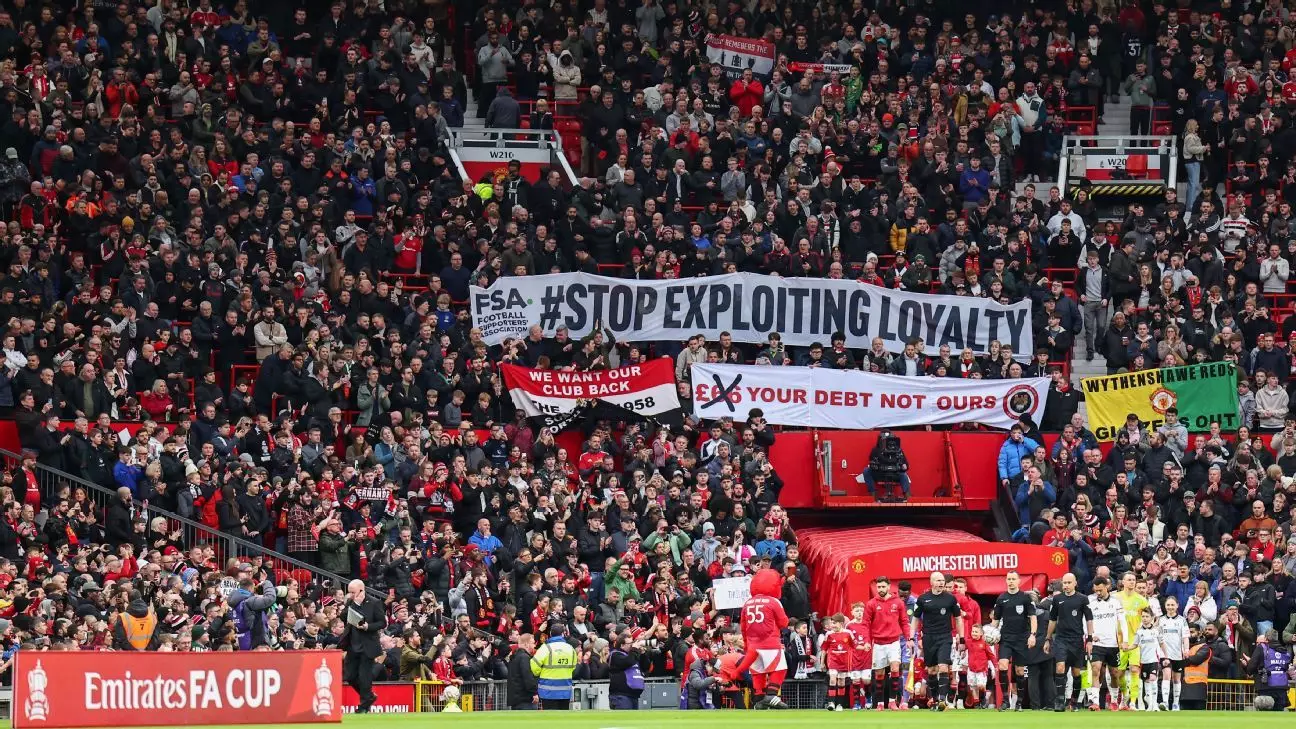As tensions rise at Old Trafford, Manchester United’s storied fanbase finds itself at a crucial juncture. The 1958, one of the club’s most prominent supporter groups, has mobilized its members for a peaceful protest, urging fans to don black attire during the much-anticipated match against Arsenal. This act isn’t just a display of solidarity; it symbolizes a collective outrage against the Glazer family’s mismanagement and the declining state of the club. The feeling among many supporters is that the heart and soul of Manchester United are at risk, and the club’s invincible identity is being diluted amid financial turmoil and abysmal performance on the pitch.
The march preceding the kickoff serves as an opportunity for fans to voice their frustrations openly. Sounds of chants mingling with the iconic sounds of football can evoke a sense of revolution, uniting fans in a shared purpose. As Manchester United grapples with a net loss of $144 million, it becomes painfully evident that the club’s financial health is at a critical checkpoint. Fans are left questioning: how did it come to this? The answer, many argue, lies firmly in the hands of the Glazers, who have overseen a steady decline in both on-field success and off-field stability since their leveraged buyout in 2005.
The figures sinking to the bottom of the profit-and-loss statement are nothing short of alarming. This isn’t merely a bad week at the office; it’s a signal of systemic failure. The staggering compensation payouts, including the hefty sum of £14.5 million to Erik ten Hag and others after recent firings, further illustrate the misallocation of resources and lack of long-term vision from the Glazers. Meanwhile, escalating debt interest payments of £18.8 million indicate a business model that operates not just in the red but in an unsustainable spiral.
This financial mismanagement raises a glaring question: Is Manchester United still a club, or has it become a business operation driven solely by profit margins? The loyal fanbase is witnessing the erosion of what made the club truly special—community, history, and passion—transmuted into a faceless entity that pushes deadlines and metrics. This transformation breeds discontent, making calls for a thorough reevaluation of ownership more urgent.
The on-field scenarios paint just as grim a picture as the financial reports. The firing of Ten Hag, followed by the appointment of Ruben Amorim, has failed to yield the much-needed revival Manchester United fans desperately craved. With disappointing performances culminating in recent setbacks, including a heart-wrenching penalty defeat to Fulham in the FA Cup, supporters are left grasping for hope as their beloved club continues to spiral downward.
The stark reality for fans is that the proverbial ‘light at the end of the tunnel’ seems dimmer than ever. The ongoing plight is one that feels almost surreal for a club with a storied history. The sense of nostalgia for past glories only deepens the pain of watching the current era unfold. It is exactly this emotional turmoil that ignites the passion for protest; the fans refuse to passively witness the institutional destruction of something they hold dear.
In their passionate statement, The 1958 argues that the Glazers’ stewardship has not only jeopardized financial sustainability but also served as a deliberate attack on fan culture. As ticket prices surge and decisions are made without the input of the very supporters who fill the stands, many feel that the essence of Manchester United is being sacrificed at the altar of profit. In a world where loyalty seems increasingly exploited, the call to action by fan groups becomes both a protest and a plea for a return to sanity.
This week’s march isn’t just about wearing black—it signifies a resounding demand for support, unity, and transformation. It’s a call to restore Manchester United to its former glory, not just for the sake of the current generation but for the legacy built by an uncountable number of fans over decades. The road ahead may be turbulent, but one thing is clear: the movement to reclaim the club is far from over, and its dynamic supporters will not go quietly into the night.


Leave a Reply